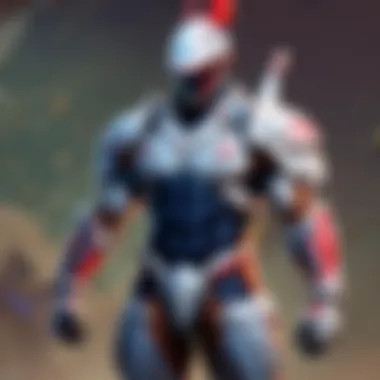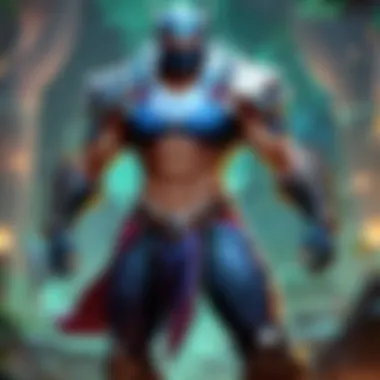Understanding the Senpai Concept in League of Legends


Intro
The concept of senpai is deeply embedded in various aspects of Japanese culture. In the context of gaming, particularly in League of Legends, it takes on a more nuanced meaning related to mentorship and guidance between players. Understanding this concept is vital, as it influences dynamics within the community and how part players current their experiences. This section aims to provide a fundamental grounding regarding the senpai concept, what it embodies, and its implications for interactions in the realm of League of Legends.
Game Overview
Prelude to League of Legends
League of Legends is one of the most popular multiplayer online battle arena (MOBA) games in the world. Developed by Riot Games, it involves two teams of five players each, where the objective is to destroy the opponent's Nexus while defending one's own. The role of each player can vary, encompassing offensive and supportive tasks.
Game Mechanics and Objectives
Players select unique characters known as characters. Each character possesses abilities that contribute specifically to team dynamics. Key elements are the laning phase, where players gain resources and experience by defeating minions, turrets, and enemy champions.
The more energy and matches players achieve can lead to greater culmination of resources, key for the eventual teamfight phase. This plays into the senpai aspect as seasoned players offer prospective strategies to their lesser-skilled peers, helping them navigate complex interactions within the game.
Brief History of the Game
Since its release in 2009, League of Legends has evolved substantially. The competitive infrastructure was built around regular seasons and tournaments that solidify its place within the eSports landscape. Each evolution can introduce players not just to new game elements but also provide insights regarding mentorship effectiveness.
“In League of Legends, knowledge is power. Just as characters in the game grow, so too do players through shared discovery.”
Playable Champions and Their Unique Abilities
League of Legends boasts a vast roster of champions. Each character has distinctive roles and skill sets that cater to specific playstyles. Some champions focus solely on offense, while others offer immense support. Successful characters combinations often dictate a team's success, creating opportunities for experienced players to teach movements and strategic considerations to newcomers.
- Tanks: Characters built to absorb damage, examply Leona or Malphite.
- Assassins: Champions like Zed or Fizz, who disrupt mades and eliminate enemy key roles quickly.
- Support: Characters such as Sona or Nami provide healing and crucial buffs to imbued abilities.
Understanding character dynamics is crucial and reflects a key part of community learning, as senpai players help newer gamers identify strengths and weaknesses of available options.
This foundation revolves around exploring mentorship modes of connection that exist heavily in gameplay.
Now, as we progress through the upcoming sections, it is informative to gain understanding on strategies that pertain to understanding placements of leadership and guidance.
Preface to Senpai in Gaming Culture
In gaming culture, particularly in titles like League of Legends, the concept of 'senpai' holds significant meaning. The dynamic within this concept often encapsulates mentorship and guidance between players. Understanding this element can enhance not only the player’s gaming experience but also foster a sense of community and connection among gamers. The nuances behind the senpai concept intertwine culture, play styles, and inter-player relationships, showcasing its necessity in gaming today.
Origin of the Term 'Senpai'
The term 'senpai' originates from Japanese language. It refers to someone who is senior or has more experience in certain areas, while 'kohai' denotes those who are junior or less experienced. This mutual relationship caters to growth and learning. In Japanese society, this terminology extends beyond gaming, reflecting respect and guidance across various fields such as business and education. Given League of Legends as a rapidly evolving competitive environment, the emergence of senpai relationships underlines intricate layers of mentorship that can be foundational in enhancing player performance.
Significance in Japanese Culture
In traditional Japanese culture, the idea of senpai holds crucial societal weight. It emphasizes respect, accountability, and the importance of relationships built around shared experiences. Senpai plays a pivotal role in guiding maatters and enhances the knowledge shared among individuals. Within the gaming sphere, these cultural roots reshape how players perceive mentorship during gameplay.


In practice, this means adopting a collective spirit, nurturing newer players through insights drawn from experience. It creates an inclusive atmosphere conducive for learning. Understanding these dynamics provides gamers with a clearer perspective on player interactions and offers greater harmony in community engagement in League of Legends.
The senpai concept embodies a broader narrative about growth and strategy in gaming, facilitating an enriching communal experience that keeps players connected to one another’s journeys.
Role of Senpai in League of Legends
The concept of senpai in League of Legends goes beyond enhances player experience. It serves as a catalyst for developing strong community dynamics and positive gameplay interactions. Understanding the role of senpai offers significant insights into how mentorship impacts individual performance and the collective gaming environment. This understanding is essential as it not only enriches characters interactions but also fosters a sense of belonging.
Mentorship Dynamics
Mentorship dynamics within League of Legends essentially hinge on the interaction between the senpai and kouhai. The senior player, or senpai, provide emotional support, guidance, and play strategies to lesser-experienced players. This creates a structured environment ensuring the sharing of skills and the cultivation of talents.
Senpai figures typically take on various responsibilities, including:
- Teaching strategy: They share their insight about specific champions or game mechanics. This includes intricate details about items build paths, timing for objectives or team fights, and more.
- Moral حمایتی: Often, players face psychological stress due to losses or competitive pressure. A supportive senpai can boost the confidence of kouhai within matches by providing reassurance.
- Community leader: Many senpai players foster a sense of community. They not only guide individuals but may also establish organized events such as practice sessions or tournaments that include their kouhai.
The ideal dynamic hinges on mutual respect. Kouhai must be open to learning, while senpai should approach mentoring with patience and understanding. Proper communication and positioned hierarchy improve this interaction, solidifying mentorship's effectiveness.
Influence on Player Development
The influence of senpai guiding other players can illustrate significant shifts in individual skill development. In many cases, players receive lessons that lead toward greater mastery of game concepts. This advancement fosters a prevailing competition within communities, and reinforces resiliency as players face challenges in their digital realm.
Through mentorship, players often experience:
- Skill Improvement: Players manipulate the knowledge accumulated from their senpai, real-time to improve performance strategically.
- Game Awareness: Players raised in healthy mentorship environments develop a notable awareness of both personal capabilities and how to assess game situations.
- Building Confidence: As skills blossom under the careful eye of a senpai, players naturally become more confident, which can significantly impact their gameplay.
"The role of a senpai transcends mere instruction; it involves the shared journey of growth within the League of Legends community."
Senpai and Community Engagement
The relationship between the concept of 'senpai' and community engagement within games like League of Legends cannot be overstated. This aspect focuses on how these mentor-mentee dynamics contribute to a more vibrant and supportive gaming culture. With the growing complexity of games, the notion of senpai becomes crucial, as it fosters the development of skills, strategic thinking, and mutual respect among players.
In this context, the mentorship provided by senpai figures creates a sense of belonging and motivation. The players who take on this adoptee role often guide new or less experienced players, enhancing their game sense and decision-making abilities. Such interactions build a community that values learning, communication, and support.
Building Communities Through Mentorship
The act of mentoring in gaming proves decisive. A room filled with seasoned players eager to share knowledge facilitates a culture of constructive feedback, which significantly impacts individual and community growth. Mentors or senpai create an environment where mistakes are analyzed rather than simply ridiculed. This enables learners to feel safe as they navigate complicated gameplay mechanics.
Benefits of this mentorship breakout include:
- Knowledge Sharing: Experienced players transfer tactics, champion picks, and strategies.
- Emotional Support: Engaging with a mentor provides a safety net for emerging players, helping them deal with frustrations typical in competitive gaming.
- Social Connections: The bonding experience among players helps establish friendships and communities, making the gaming experience more enjoyable.
Players who actively engage in this senpai-kouhai relationship experience an increase in their enjoyment and retention in the game.
Senpai vs.


Kouhai Relationships
Understanding senpai and kouhai dynamics is pivotal to grasping community engagement fully. While senpai refers to those with more experience, kouhai refers to those with less. A properly balanced relationship leverages this hierarchy of expertise beneficially.
This relationship is interactive. While senpai carries the responsibility of guiding, the kouhai contributes through feedback regarding their learning process. Respect and open communication form the foundation of these interactions.
In many ways, these relationships are educational rather than transactional.
Key distinctions are:
- Leadership Dynamics: Senpai have the authority to direct and advise, but this power is grounded in mutual trust rather than dominance.
- Growth Opportunities: Kouhai benefit which sparks lifelong learning and enables senpai to develop their skills in communication and leadership through mentorship.
“The strength of a good gaming community lies in its mentor network, where everyone learns from everything.”
Lastly, it is essential to note how these relationships evolve. New players can eventually grow and take on roles of a senpai themselves, thus renewing the cycle of mentorship in the gaming environment, making it sustainable and enriching for everyone involved.
Gameplay Implications of the Senpai Concept
The senpai concept deeply influences gameplay dynamics in League of Legends. This relationship fosters a culture of guidance and learning among players, significantly impacting their progression and overall experience in the game. Senpai figures typically serve as mentors, which can lead to more structured skill development. By understanding the implications, players can harness the power of these relationships for improved performance and enjoyment.
Strategies for Effectiveness
Effective strategies shaped by the senpai concept often include:
- Clear Communication: Open dialogue between a senpai and their kouhai (junior) is fundamental. This helps in understanding the strengths and weaknesses of each player.
- Regular Practice Sessions: Scheduling consistent practice not only reinforces gameplay mechanics but also solidifies their mentorship roles.
- Feedback Mechanisms: Constructive feedback is critical to fostering improvement. Mentors can provide targeted insights on gameplay strategies and decision-making.
- Goal Setting: Establishing specific, measurable objectives can enhance motivation. Goals can range from achieving certain ranks to mastering particular champions.
These strategies support a dynamic learning environment, which directly benefits player skills, knowledge, and overall team synergy.
Psychological Aspects of Mentorship
The psychological impact of the senpai concept is notable. It creates unique emotional ties that benefit both parties. Some key aspects include:
- Increased Confidence: Having a supportive mentor boosts the confidence of a kouhai. When they receive guidance and encouragement, they are more likely to take risks in their gameplay.
- Reduced Anxiety: Senior players can ease the pressure on newer players. Understanding the ropes with the backing of an experienced player can lessen competitive tensions.
- Sense of Belonging: Being part of a mentor-mentee dynamic fosters community. This connection provides a support structure that encourages players to stay engaged in the game.
- Identity Reinforcement: Becoming a senpai or kouhai can enhance a player’s identity within the game. This affiliation with a respected role gives them a greater purpose.
Understanding these psychological aspects can enrich the overall gaming experience. It allows players to enjoy the nuances of League of Legends deeply and personally.
In gaming, the relationships we form with others can influence our performance more than the mechanics we learn.
Challenges Faced by Senpai Figures
The role of senpai in gaming, especially in League of Legends, comes with notable complexities. Mentorship brings significant responsibilities and creates expectations. This dynamic can be demanding, affecting both the mentor and the learners. Understanding these challenges is crucial for fostering a positive mentorship environment. It helps in enhancing player retention and community growth. For many, being a senpai is more than just leading; it involves personal growth and adaptation in response to the gaming community's needs.
Responsibility and Expectations
Being a senpai carries substantial weight. Mentors often feel an innate obligation to guide their students effectively. This sense of duty requires experience, knowledge, and skills. Individuals in a mentoring position need also set clear objectives. Without these goals, mentorship can easily drift into confusion and frustration.


Moreover, players might anticipate certain outcomes from their senpai. There is a minimal guarantee that a senpai's influences will lead to competitive success. For instance, an aspiring player may expect direct improvement in skills, but learning curves vary widely. This can lead to disappointment should a learner not meet expected milestones.
A few key responsibilities a senpai should be aware of include:
- Knowledge Sharing: Deliver coherent and detailed gameplay tips.
- Emotional Support: Validate players' feelings when they face obstacles.
- Adaptability: Change mentoring styles according to each student's needs.
Dealing with Player Reactions
Players' reactions toward their mentors run the spectrum from highly appreciative to openly critical. It is vital for a senpai to navigate these responses tactfully. Both praise and criticism have psychological impacts on improvement. Positive reinforcement can motivate players, whereas negativity may reduce their self-confidence.
What makes reactions interesting is their variability. Players react in unique ways due to their past experiences, expectations, and personal challenges. Thus, it becomes vital for senpai figures to adopt effective communication strategies.
Here are some strategies for handling player reactions:
- Listen Actively: Provide space for players to express concerns or ideas.
- Be Objective: Focus feedback on gameplay rather than personal traits.
- Maintain Composure: Stay calm even in the face of unreasonable criticism; it promotes a positive community.
"The most integral part of being a senpai is balancing the role of a mentor while fostering an atmosphere where learners thrive without undue pressure."
The Future of the Senpai Concept in Gaming
The concept of senpai is crucial for understanding how mentorship and community dynamics can influence the gaming experience. With an ever-evolving landscape in human interactions within video games, especially in popular platforms like League of Legends, the future of this concept is still being developed. As young gamers join the community, they seek guidance from more experienced players. This forum of mutual learning has the potential to shape gameplay and social experiences.
Evolving Interpretations
As gaming culture develops, so do the interpretations of what it means to be a senpai. Whereas senpai traditionally denotes a senior or mentor in Japanese culture, in League of Legends, it takes on varied meanings. Players often view senpai figures as not just mentors, but crucial components of the community fabric. Such evolving definitions lead to a greater understanding of roles that inclusivity and diversity play in enhancing player experiences. Different players bring unique perspectives on how senpai status is recognized and leveraged within gameplay.
Some see senpai as a title earned through gameplay prowess, while others might view it as an emergent role based on attentiveness and willingness to teach. These shifting perceptions can provide deeper insights into player interactions, leading to various cooperation levels that can foster teamwork.
Potential Impact on Esports
The growing popularity of esports introduces new layers to the senpai concept. Its influence can redefine competitive gaming, particularly in relation to mentorship and support structures. As professionals enter their guilds and teams, senpai figures may emerge who serve critical roles in training youn โนгоs and novices. Proper alignment of mentorship and written strategy can have direct impact on competitive success
While performance enhances the visibility of senpai, budding talents may find inspiration and confidence under these personalities, shaping the upcoming players' mindset in various competitions and tournaments. More success leading teams towards this mentorship model may bolster creator communities. Mentorship development within teams can set precedence for new players, ensuring better skills and preparation for larger battles beyond their specified ranks. It strengthens the competition overall and pushes it towards new achievements.
The senpai concept signifies a lasting bond among players, transforming competition into camaraderie.
As gaming continues to evolve, the resurgence of senpai relationships may impact how communities operate. Upcoming generations will likely expect support structures to properly rise. Recognizing achievements gives proof of the evolution of leagues, supporting personal and player achievements critical to gaming's future.
Finale
The exploration of the senpai concept within League of Legends offers valuable perspectives on mentorship and community dynamics. This article highlights specific elements such as the significance of guidance in player development and the importance of nurturing positive connections between players.
Summarizing the Senpai Legacy
The legacy of the senpai concept is profound in the gaming community. It shapes both casual interactions and competitive philosophies. Mentorship encourages skill enhancement and provides a support system for less experienced players. It fosters an environment where knowledge is shared, leading to collective improvement. Players who take on the senpai role contribute not only to individual growth but also to a more robust community culture. This reciprocal dynamic reinforces the bond between players, enabling them to challenge each other and to learn collaboratively.
Final Thoughts on Player Connections
Consideration of senpai relationships prompts a deeper understanding of player interactions. They are critical in League of Legends, where teamwork often influences outcomes. Building these connections elevates the overall gaming experience by prioritizing empathy and mutual respect atop competitive nature. Such connections transcends beyond mere gameplay. They create safe spaces for sharing experiences, which can provide significant mental balance.
Ultimately, the senpai concept emphasizes that gaming isn’t just about skill; it’s about community, growth, and relationships. Incorporating this ethos within League of Legends creates a more nurturing environment that benefits all players.



